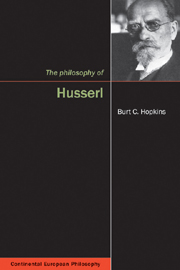Book contents
- Frontmatter
- Contents
- Acknowledgements
- Abbreviations
- Prolegomenon: Husserl's turn to history and pure phenomenology
- I Plato's and Aristotle's theory of eidē
- II From descriptive psychology to transcendentally pure phenomenology
- III From the phenomenology of transcendental consciousness to that of monadological intersubjectivity
- IV From monadological intersubjectivity to the historical a priori constitutive of all meaning
- V The unwarranted historical presuppositions guiding the fundamental ontological and deconstructive criticisms of transcendental philosophy
- 16 The methodological presupposition of the ontico-ontological critique of intentionality: Plato's Socratic seeing of the eidē
- 17 The mereological presupposition of fundamental ontology: that Being as a whole has a meaning overall
- 18 The presupposition behind the proto-deconstructive critique of intentional historicity: the conflation of intrasubjective and intersubjective idealities
- 19 The presupposition behind the deconstruction of phenomenology: the subordination of being to speech
- Epilogue: Transcendental-phenomenological criticism of the criticism of phenomenological cognition
- Coda: Phenomenological self-responsibility and the singularity of transcendental philosophy
- Notes
- Bibliography
- Index
17 - The mereological presupposition of fundamental ontology: that Being as a whole has a meaning overall
from V - The unwarranted historical presuppositions guiding the fundamental ontological and deconstructive criticisms of transcendental philosophy
- Frontmatter
- Contents
- Acknowledgements
- Abbreviations
- Prolegomenon: Husserl's turn to history and pure phenomenology
- I Plato's and Aristotle's theory of eidē
- II From descriptive psychology to transcendentally pure phenomenology
- III From the phenomenology of transcendental consciousness to that of monadological intersubjectivity
- IV From monadological intersubjectivity to the historical a priori constitutive of all meaning
- V The unwarranted historical presuppositions guiding the fundamental ontological and deconstructive criticisms of transcendental philosophy
- 16 The methodological presupposition of the ontico-ontological critique of intentionality: Plato's Socratic seeing of the eidē
- 17 The mereological presupposition of fundamental ontology: that Being as a whole has a meaning overall
- 18 The presupposition behind the proto-deconstructive critique of intentional historicity: the conflation of intrasubjective and intersubjective idealities
- 19 The presupposition behind the deconstruction of phenomenology: the subordination of being to speech
- Epilogue: Transcendental-phenomenological criticism of the criticism of phenomenological cognition
- Coda: Phenomenological self-responsibility and the singularity of transcendental philosophy
- Notes
- Bibliography
- Index
Summary
We have shown that Heidegger's critical interpretation of Greek ontology, especially Plato's, is limited by his employment of Husserl's discovery of categorial intuition as his guide. Because Heidegger's critique engages the early stages of Husserl's development, before history became a positive thematic concern of Husserl's phenomenology, we shall defer discussion of the implications of the limits exposed here of Husserl's early thought vis-à-vis the Greek origins of philosophy until our discussion of the transcendental criticism of the criticism of phenomenological cognition. What needs to be discussed now is the other side of Heidegger's critique: that Husserl's reflective and eidetic method is incapable of overcoming its ontological limitations. This is especially the case because, by having shown the limits of Husserl's phenomenology (his early phenomenology, at any rate) as a guide to Plato's and Aristotle's accounts of the eidē, it may seem that we have indirectly confirmed Heidegger's criticisms of its ontological limits.
As mentioned, the ontological limitations that Heidegger claims are inseparable from Husserl's reflective and eidetic method concern the structural limitations that condition their exclusive focus on discovering what is there to be discovered in entities with their perception. What is excluded by this focus is supposed to be the way to be of entities when they are not being perceptually apprehended and the interrogation of the meaning of their Being that is presupposed by this exclusive mode of their apprehension.
- Type
- Chapter
- Information
- The Philosophy of Husserl , pp. 232 - 245Publisher: Acumen PublishingPrint publication year: 2010



